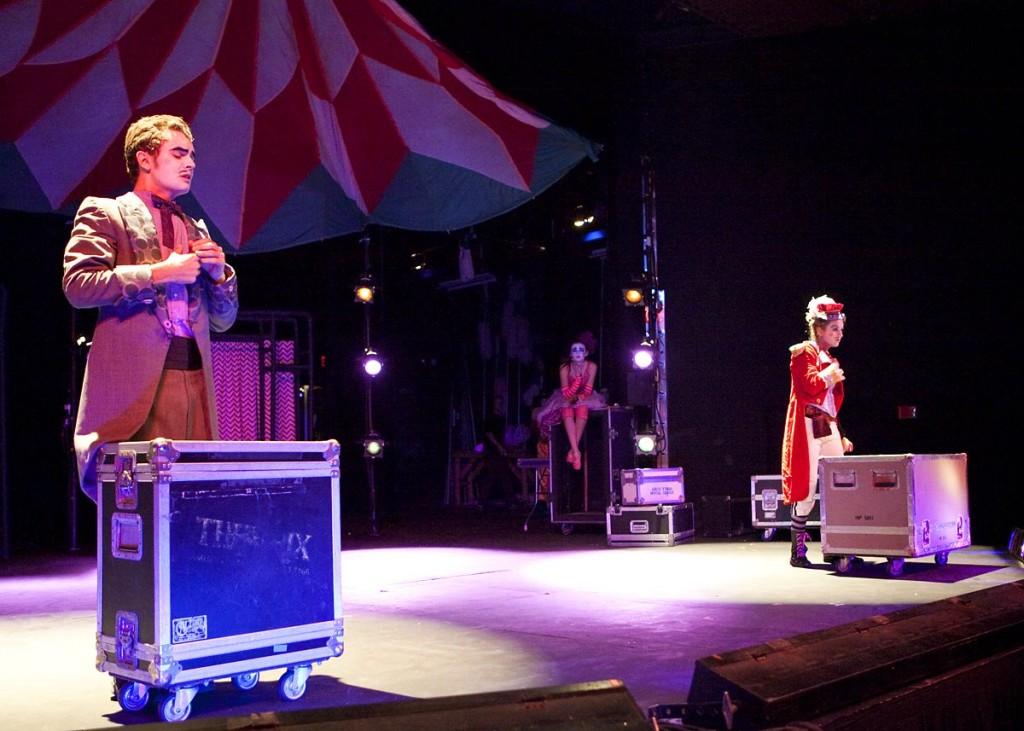Tech Theatre: Behind the Scenes
It’s 10pm on a Tuesday night during tech week. The actors and actresses are running every scene as if there were an audience. Meanwhile, spotlights appear, move, and disappear exactly on cue as well as the actors lines.
Williston’s production of Carlo Goldoni’s A Servant to Two Masters opened on Thursday, October 17th, continued the nights of the 18th and 19th, and showed again on the 24th, the 25th, and the 26th. For the past several weeks, an enormous amount of effort has been put forth to ensure that the play is a success. Indeed, this funny and well-executed play has received both hype and praise, as have the actors and actresses involved. However, outsiders can sometimes overlook all that occurs behind the scenes because they do not know the amount of backstage effort that goes into making both the play and fall dance concert successful.
Tech. Theatre is an after school elective taught by Mr. Raffeto and chosen by many students who wish to learn more about technology and want serve as an essential role in the play. Working backstage requires an enormous amount of training and skill, which takes time to master. Since the beginning of the fall term, students who chose to partake in tech. theatre have been busy at work learning how to operate backstage technology while building and painting sets and props.
Those in Tech. Theatre also need to know the placements of each of the props and when they need to be moved to a certain place on the stage. Sophomore Cam Stanley, whose job is a “props ASM,” or props assistant stage manager, says that she and a few other crew members in her group are always “ready to jump in when someone needs help.”
Melissa Falcone is a junior at Williston who plays the role of Beatrice Rasponi in the production. She explained, “Props are extremely important to us actors, prop movement often determines certain blocking cues and even speaking cues. Often times actors are cued to go on stage by dialogue but in certain scenes, prop movement is our cue.” Melissa Falcone referenced the scene in which she and actor Harry Shea attempt to kill themselves, stressing that the cue to that particular scene is based entirely on prop movement.
Not only does Tech. Theatre keep you on your toes at all times, but it also requires a great deal of patience. Sophomore Olivia Cueves said, “some of the projects Mr. Raffetto sets up for are tedious and need a lot of care and attention.”
Cam Stanley also said that Tech. Theatre requires a lot of patience and trust. She has learned “the importance of relying on others and trusting that their job is done right.” She explained that it takes many components to put together a show, and each component relies on the others, “The actors rely on us, and we rely on each other” she says.
“The backstage crew is half of the performance!” says Melissa Falcone. “Their hard work backstage often goes unnoticed, but we would not have a show without our fabulous crew,” she added.
The students in Tech. Theatre, or “techies,” as Olivia Cueves calls them, have much to learn and memorize. They have been meeting every afternoon from 3:45 to 5:15pm. They were each offered a choice of what job they wished to do in the show. Olivia Cueves said that Mr. Raffetto gave them each the choice between working behind the scenes at the dance concert or behind the scenes at the play. Those techies who work the play have been to every play rehearsal, dress rehearsal, and performance thus far, which can last for up to five hours, or from 6 to 11pm.
After learning what each job was and what each position required, techies were able to choose which position they each preferred. Cam Stanley says, “Mr. Raffetto, the ‘adult supervision,’ received applications we sent in and he decided who would be doing what.” Olivia Cueves described Mr. Raffetto’s attitude towards them, saying, “He is very good at giving you the job that you might want. He will always listen to whatever you have to say.”
When asked what she does for a job in A Servant to Two Masters, Olivia Cueves says “I do my job in what we call The Booth which is on the second floor of Scott Hall.” Which is where, she explained, “the sound, lights, intercoms, head sets and pretty much anything and everything is controlled.”
“Lighting is essential to the performance, different colors indicate certain emotions to set the mood and tone In the show,” says Melissa Falcone, “It is just another element put forth in our story telling process.”
Olivia Cueves said “I have learned that just because someone is not on stage for the performance and is back behind stage, does not mean in any way that they are of any lesser importance than the actors.”



